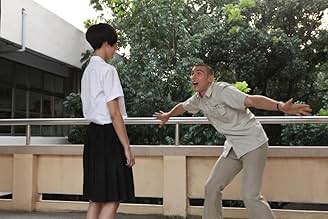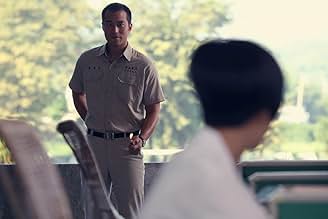IMDb-BEWERTUNG
7,0/10
2175
IHRE BEWERTUNG
Füge eine Handlung in deiner Sprache hinzuWhen three rebellious students leave their hometown to pursue their lifelong dreams in the big city, their relationships start to face the pressures of real life as the 1980s Taiwanese socio... Alles lesenWhen three rebellious students leave their hometown to pursue their lifelong dreams in the big city, their relationships start to face the pressures of real life as the 1980s Taiwanese socio-political reformation movement unfolds in the background.When three rebellious students leave their hometown to pursue their lifelong dreams in the big city, their relationships start to face the pressures of real life as the 1980s Taiwanese socio-political reformation movement unfolds in the background.
- Auszeichnungen
- 8 Gewinne & 25 Nominierungen insgesamt
Hsiao-chuan Chang
- Liam
- (as Joseph Chang)
Nai-Hua Lin
- Liam's Mother
- (as Nai-Hua Chiu)
J.C. Lei
- Younger Twin Sister - 2012
- (as Hsiao-Lan Chang)
Empfohlene Bewertungen
Of all topics, who would have thought the concept of Taiwanese nationalism would have been such a difficult one to convey on screen? Last year, the ambitious but bloated Warriors of the Rainbow made a respectable attempt to tell the story of the Taiwanese Indigenous and their battle to keep their land against the invading Japanese. In 2012, director Ya-Che Yang travels down a more contemporary path, as Girlfriend Boyfriend recounts the changing lives and persistent love triangle between three close friends against the backdrop of social upheaval, as Taiwan breaks free of its martial law rule and attempts to forge a new identity.
Admittedly, this film's political agenda plays a secondary role to the interplay between its three main characters (Lun Mei Gwei, Hsiao-Chuan Chang and Fon Yuen Vaughan), for which it should be commended, but that is where the applause ends. Because for all its promise, Girlfriend Boyfriend simply cannot decide what sort of film it wants to be, and the result is a disjointed cluster of unnecessary side plots and generally melodramatic fare.
For a film that classifies itself as a comedy, it facilitates no laughs beyond the opening act, instead gradually descending into a miserable soap opera. That is not to say that its attempt at humour was off the mark; an impossibility due to the total lack of humour in the first place.
The film's attempt to deepen the story by throwing in new themes for the characters to intermittently deal with (including adultery, homosexuality and self-inflicted disconnectedness) actually has the opposite effect, as the plot becomes needlessly convoluted. It closes on an ending intending to justify the struggles each character has endured, but the fact that it completely overlooks the fate of Aaron, arguably the film's most relatable character, leaves the viewer wanting more, but also glad that the ordeal is over.
*There's nothing I love more than a bit of feedback, good or bad. So drop me a line on jnatsis@iprimus.com.au and let me know what you thought of my review. If you're looking for a writer for your movie website or other publication, I'd also love to hear from you.*
Admittedly, this film's political agenda plays a secondary role to the interplay between its three main characters (Lun Mei Gwei, Hsiao-Chuan Chang and Fon Yuen Vaughan), for which it should be commended, but that is where the applause ends. Because for all its promise, Girlfriend Boyfriend simply cannot decide what sort of film it wants to be, and the result is a disjointed cluster of unnecessary side plots and generally melodramatic fare.
For a film that classifies itself as a comedy, it facilitates no laughs beyond the opening act, instead gradually descending into a miserable soap opera. That is not to say that its attempt at humour was off the mark; an impossibility due to the total lack of humour in the first place.
The film's attempt to deepen the story by throwing in new themes for the characters to intermittently deal with (including adultery, homosexuality and self-inflicted disconnectedness) actually has the opposite effect, as the plot becomes needlessly convoluted. It closes on an ending intending to justify the struggles each character has endured, but the fact that it completely overlooks the fate of Aaron, arguably the film's most relatable character, leaves the viewer wanting more, but also glad that the ordeal is over.
*There's nothing I love more than a bit of feedback, good or bad. So drop me a line on jnatsis@iprimus.com.au and let me know what you thought of my review. If you're looking for a writer for your movie website or other publication, I'd also love to hear from you.*
8tpsn
I don't speak Mandarin but thoroughly enjoys this film. High recommended for anyone who is interested in foreign film!
Those clued in to Taiwan's much-hyped cinematic wave and new generation of auteurs will find Ya-che Yang's new work familiar ground.
A blend of coming-of-age realities and a fair dose of human drama, it's a formula that has been shown to work wonders.
Moderation, however, is often shown to be the achilles heel when following such proved plot formulas. And while the film touches many a raw soul rooted in the conundrums of unrequited love, it is also perhaps where Girlfriend Boyfriend flatters to deceive.
Set against Taiwan's political wave of student uprisings in 1985, Girlfriend Boyfriend is a film about three school students coming to grips with their sexualities and self-consciousness.
Sean (Shu-Hao Chang), Liam (Hsiao-chuan Chang) and Mabel (Lunmei Kwai) are best friends who are bonded by the anti-establishment ideology of the time.
Each brings a different element and perspective but all three pieces fit into a perfect team picture of revolutionary prodigies staking their places in society.
Of course, the adrenalin-charging environment of the times can only raise the levels of raging teenage hormones, and the viewer is slowly thrown to question whether their friendship is defined by bonds, or by their own love agendas.
In giving each of his three leading characters a distinctive unyielding persona, Ya-che Yang sets the development of his characters in a natural motion as the years pass.
While the consistency helps the viewer take a liking to them and their unconventional ideologies, it also surfaces a rigidity that extends to their love interests. And that, while stemmed in the film's main theme, is also what this critic felt was overscripted to the point of tiresome blabber.
All in all, the viewer leaves the theatre sharing the sense of resignation to life's conundrums the film's three lead characters convey through their complicated characters at some time or another.
The great Oscar Wilde penned "Life imitates Art far more than Art imitates Life"
If it was pertaining to Girlfriend Boyfriend (2012), it might make sense to put away the tissue box readied for Hollywood-esque heart-rending moments, and bring a state of human consciousness into the theatre.
A blend of coming-of-age realities and a fair dose of human drama, it's a formula that has been shown to work wonders.
Moderation, however, is often shown to be the achilles heel when following such proved plot formulas. And while the film touches many a raw soul rooted in the conundrums of unrequited love, it is also perhaps where Girlfriend Boyfriend flatters to deceive.
Set against Taiwan's political wave of student uprisings in 1985, Girlfriend Boyfriend is a film about three school students coming to grips with their sexualities and self-consciousness.
Sean (Shu-Hao Chang), Liam (Hsiao-chuan Chang) and Mabel (Lunmei Kwai) are best friends who are bonded by the anti-establishment ideology of the time.
Each brings a different element and perspective but all three pieces fit into a perfect team picture of revolutionary prodigies staking their places in society.
Of course, the adrenalin-charging environment of the times can only raise the levels of raging teenage hormones, and the viewer is slowly thrown to question whether their friendship is defined by bonds, or by their own love agendas.
In giving each of his three leading characters a distinctive unyielding persona, Ya-che Yang sets the development of his characters in a natural motion as the years pass.
While the consistency helps the viewer take a liking to them and their unconventional ideologies, it also surfaces a rigidity that extends to their love interests. And that, while stemmed in the film's main theme, is also what this critic felt was overscripted to the point of tiresome blabber.
All in all, the viewer leaves the theatre sharing the sense of resignation to life's conundrums the film's three lead characters convey through their complicated characters at some time or another.
The great Oscar Wilde penned "Life imitates Art far more than Art imitates Life"
If it was pertaining to Girlfriend Boyfriend (2012), it might make sense to put away the tissue box readied for Hollywood-esque heart-rending moments, and bring a state of human consciousness into the theatre.
A well-made, coming-of-age drama that explores friendship, romance, sexuality and politics, Yang Ya-Che's GF*BF (alternatively titled as GIRLFRIEND BOYFRIEND) is one of the best Taiwanese movies I've ever come across. No wonder the movie is well-deserved to earn 7 nominations at the 49th Golden Horse Awards (which later won Gwei Lun-Mei a Best Actress award as well as Audience Choice Award).
Told over the span of three decades (1985, 1997 and 2012), the movie begins with a brief prologue set in the present day before it goes back in time in 1985, where we are introduced to three Taiwan high-schoolers Mabel (Gwei Lun-Mei), Liam (Joseph Chang) and Aaron (Rhydian Vaughan). All of them are activists rebelling against the martial law during the turbulent period of 1980s Taiwan. On the personal side, Mabel loves Liam a lot, but Liam doesn't really have a feeling for her. So she ends up falling in love with Aaron instead. Liam, in the meantime, is actually a closeted homosexual who's been longing for Aaron. This is one complicated love triangle which will make your head spin upon watching the movie.
Which is why the trio's love triangle is one of the unique selling points in GF*BF. All three actors delivered top-notch and remarkably convincing performances where you'll feel emotionally involved with them. Gwei Lun-Mei is particularly excellent in what would be her best performance to date as a spunky girl with hidden vulnerability. Joseph Chang is equally captivating as a silent-type individual who loves to bottle up his emotion, and he's especially good when he communicates his character through his expressive eyes. Rhydian Vaughan is perfectly cast as a playful and sweet-talking Aaron.
Yang's direction is well-calculated and more than often, he successfully delivers a roller-coaster ride of varied emotions ranging from happiness to heartbreak with such genuine affection. On the other hand, Yang's keen observation over the multiple themes he's been exploring throughout his movie is passionately told, yet thought-provoking enough at the same time. Even the political aspect depicted earlier in the movie, which is actually served as a mere backdrop, has a certain impact served in his storyline.
The 1985 segment is easily the most memorable moment of all as Yang captures the sheer exuberance of what it's like to be a rebellious youth during that particular era where rules don't apply and freedom of speech is crucial for living a life to the fullest.
If there's a flaw in the movie, I must say that Vaughan's performance can be a bit underwhelming at times. Other than that, Yang's complicated storyline can be a little convoluted.
Production values are ace, while the soundtrack hits all the right notes in term of capturing the essence of the three different eras as well as the overall context of the movie.
Told over the span of three decades (1985, 1997 and 2012), the movie begins with a brief prologue set in the present day before it goes back in time in 1985, where we are introduced to three Taiwan high-schoolers Mabel (Gwei Lun-Mei), Liam (Joseph Chang) and Aaron (Rhydian Vaughan). All of them are activists rebelling against the martial law during the turbulent period of 1980s Taiwan. On the personal side, Mabel loves Liam a lot, but Liam doesn't really have a feeling for her. So she ends up falling in love with Aaron instead. Liam, in the meantime, is actually a closeted homosexual who's been longing for Aaron. This is one complicated love triangle which will make your head spin upon watching the movie.
Which is why the trio's love triangle is one of the unique selling points in GF*BF. All three actors delivered top-notch and remarkably convincing performances where you'll feel emotionally involved with them. Gwei Lun-Mei is particularly excellent in what would be her best performance to date as a spunky girl with hidden vulnerability. Joseph Chang is equally captivating as a silent-type individual who loves to bottle up his emotion, and he's especially good when he communicates his character through his expressive eyes. Rhydian Vaughan is perfectly cast as a playful and sweet-talking Aaron.
Yang's direction is well-calculated and more than often, he successfully delivers a roller-coaster ride of varied emotions ranging from happiness to heartbreak with such genuine affection. On the other hand, Yang's keen observation over the multiple themes he's been exploring throughout his movie is passionately told, yet thought-provoking enough at the same time. Even the political aspect depicted earlier in the movie, which is actually served as a mere backdrop, has a certain impact served in his storyline.
The 1985 segment is easily the most memorable moment of all as Yang captures the sheer exuberance of what it's like to be a rebellious youth during that particular era where rules don't apply and freedom of speech is crucial for living a life to the fullest.
If there's a flaw in the movie, I must say that Vaughan's performance can be a bit underwhelming at times. Other than that, Yang's complicated storyline can be a little convoluted.
Production values are ace, while the soundtrack hits all the right notes in term of capturing the essence of the three different eras as well as the overall context of the movie.
You should really go with your Asian friend.
This is the best Taiwanese movie i have ever seen, which talks about love.
The way it presents the story is so romantic, that you will literally fall in love with the movie.
Main actors and actress are so cute, their acting is natural, sentimental, and tear-alluring.
I really hope more and more MADE IN TAIWAN can find its market in the U.S., there are so many people here who appreciates Taiwanese products, especially their amazing movies.
Love it
This is the best Taiwanese movie i have ever seen, which talks about love.
The way it presents the story is so romantic, that you will literally fall in love with the movie.
Main actors and actress are so cute, their acting is natural, sentimental, and tear-alluring.
I really hope more and more MADE IN TAIWAN can find its market in the U.S., there are so many people here who appreciates Taiwanese products, especially their amazing movies.
Love it
Wusstest du schon
- VerbindungenReferences Casablanca (1942)
Top-Auswahl
Melde dich zum Bewerten an und greife auf die Watchlist für personalisierte Empfehlungen zu.
- How long is Girlfriend Boyfriend?Powered by Alexa
Details
- Erscheinungsdatum
- Herkunftsland
- Offizieller Standort
- Sprachen
- Auch bekannt als
- Gf*Bf
- Produktionsfirma
- Weitere beteiligte Unternehmen bei IMDbPro anzeigen
Box Office
- Bruttoertrag in den USA und Kanada
- 64.414 $
- Eröffnungswochenende in den USA und in Kanada
- 29.016 $
- 5. Aug. 2012
- Weltweiter Bruttoertrag
- 667.626 $
- Laufzeit1 Stunde 46 Minuten
- Farbe
- Seitenverhältnis
- 2.35 : 1
Zu dieser Seite beitragen
Bearbeitung vorschlagen oder fehlenden Inhalt hinzufügen































